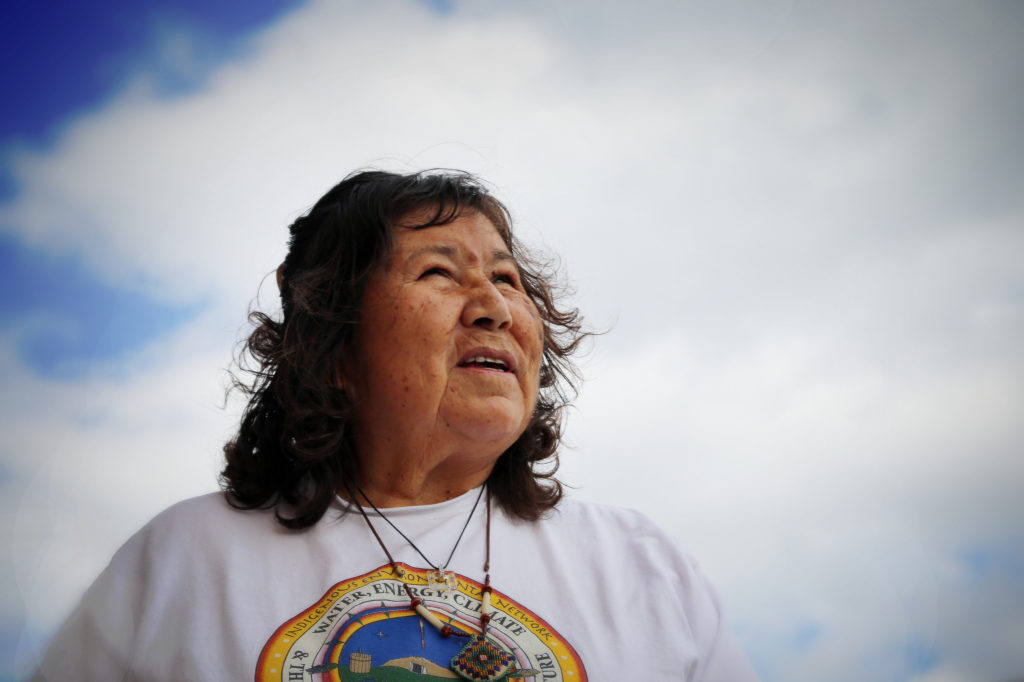 “Water has to live, it can hear, it can sense what we’re saying, it can really, really, speak to us. Some songs come to us through the water. We have to understand that water is very precious.”
“Water has to live, it can hear, it can sense what we’re saying, it can really, really, speak to us. Some songs come to us through the water. We have to understand that water is very precious.”
With a copper pail of water in one hand and a staff in the other, Josephine Mandamin, an Anishabaabewe grandmother took on a sacred walk, traversing over 10,900 miles around each of the Great Lakes. She is known as the “Water Walker.”
According to the Michigan Sea Grant, the Great Lakes shoreline is equal to almost 44% of the circumference of the earth. “When you see someone walking with a pail of water, you wonder, where is she going with that water.”
So the message is, water is very precious, and I will go to any lengths to and direction to carry the water to the people.”
“As women, we are carriers of the water. We carry life for the people. So when we carry that water, we are telling people that we will go any lengths for the water. We’ll probably even give our lives for the water if we have to. We may at some point have to die for the water, and we don’t want that,” said Mandamin.
Mandamin joined the team of indigenous representatives from the Indigenous Environmental Network at the People’s Climate March during the week of September 18th to the 24th. “Why I’m here is because I really feel for the water. And to give the message to people that Water is a human right.”
“Water has to live, it can hear, it can sense what we’re saying, it can really, really, speak to us. Some songs come to us through the water. We have to understand that water is very precious.”
In Anishinaabekwe culture, women are given the responsibility to take care of the water. “The water of Mother Earth, she carries life to us, and as women we carry life through our bodies. We as women are life-givers, protectors of the water, and that’s why we are very inclined to give mother earth the respect that she needs for the water,” said Mandamin.
That’s our responsibility, our role, and our duty, to pass on the knowledge and understanding of water, to all people, not just Anishinabe people, but people of all colors.”
In the wake of extreme extractive industries such fracking, oil, and coal, access to clean water is rapidly declining. “In our prophecies, in our Three Fires Midewiwin Society, we are taught that water is very precious. I was told by a grand chief that 30 years from now an ounce of water will cost as much as an ounce of gold if we continue with our negligence,” said Mandamin.
“If we discontinue our negligence, we can change things around. That’s why I am really embodying the prophecy. You’ve heard of ‘Walk The Talk,’ this is why I walk.”
*photos and article by Ayse Gursoz

I would like to share my utmost respect for Grandmother Josephine’s willingness to listen to the call to be guided to begin this journey. I happened to come across the documentary “Waterlife” several years ago and shared it with my students. Then a few other teachers also ordered copies to share with their students. I was just figuring that we have reached nearly 2000 13/14 year olds. Every year their eyes go wide when I say these are real people and and they really do this walk. I had no idea this website existed and I expect my students to help make a donation next year. Seven generations. We are part of the Lake Huron watershed and I am hopeful to be helping to raise good caretakers of this gift. Thank you to all who have given of their time and talents. Bless you all!